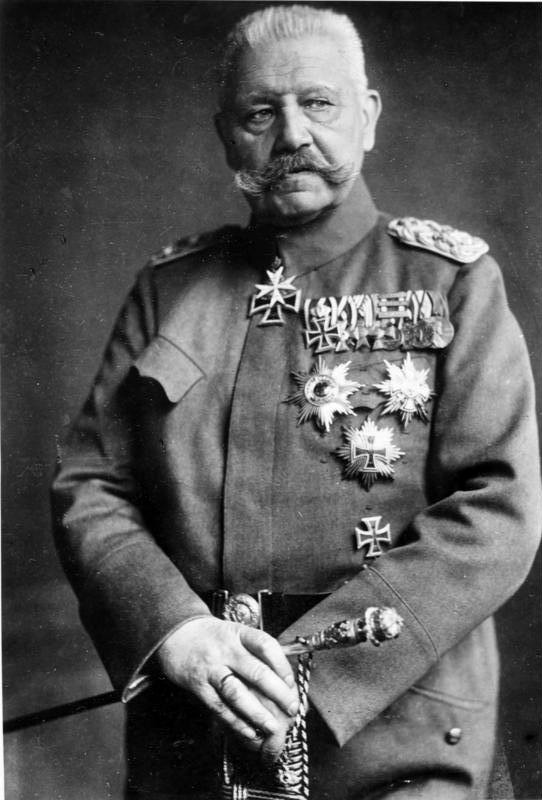13. srpna 1932 k Hitlerovi
Zdroj: [Evans, Richard J., 2006, Nástup Třetí říše, Dobrovský, 278, 80-7306-257-7]
Paul von Hindenburg citáty a výroky
Paul von Hindenburg: Citáty anglicky
“Prosperity can come through peace alone.”
Kontext: Prosperity can come through peace alone. The German people are in favor of all possible means to make war impossible. I have seen three wars. A man who has seen three wars never will wish another war. He must be a friend of peace.
But I am not a pacifist. All my impressions of war are so bad that I could be for it only under the sternest necessity — the necessity of fighting Bolshevism or of defending one's country.
Interview with Senator Beveridge (March 1915), Paul Dehn, Hindenburg, als Erzieher (1918), p. 43, quoted in W. W. Coole (ed.), Thus Spake Germany (London: George Routledge & Sons, 1941), p. 174
Supreme Commander of All German Forces in the East
As quoted in With Snow on Their Boots : The Tragic Odyssey of the Russian Expeditionary Force in France During World War I (1999) by Jamie H. Cockfield, p. 28
Undated
Out of My Life (London: Cassell, 1920), pp. 236-237
Retirement
1 August 1934
Variant translation:
I am not a pacifist. That is not my attitude. But all my impressions of war are so bad that I could be for it only under the sternest necessity — the necessity of fighting Bolshevism or of defending one's country.
As quoted in TIME magazine (13 January 1930)
President
As quoted in The Great War: Sources and Evidence (1995) by David Stewart, James Fitzgerald and Alf Pickard, p. 269
Undated
The Great War: A Combat History of the First World War (2013) by Peter Hart, p. 242
Undated
Letter to Chancellor Adolf Hitler http://alphahistory.com/nazigermany/hindenburg-and-hitler-on-jewish-war-veterans/, (April 4th 1933)
President
As quoted in TIME magazine (13 January 1930)
President
Letter to Friedrich Ebert after the Treaty of Versailles was presented to Germany (17 June 1919), quoted in Andreas Dorpalen, Hindenburg and the Weimar Republic (Princeton University Press, 1964), p. 39 and John W. Wheeler-Bennett, The Nemesis of Power: The German Army in Politics 1918-1945 (London: Macmillan, 1964), p. 52
Chief of the German General Staff
Letter to Friedrich Ebert (8 December 1918), quoted in John W. Wheeler-Bennett, The Nemesis of Power: The German Army in Politics 1918-1945 (London: Macmillan, 1964), p. 29
Chief of the German General Staff
“I need them for the manoeuvring of my left wing in the next war.”
Recommending the annexation of the Baltic Provinces at the Crown Council at Kreuznach (18 December 1917), quoted in John W. Wheeler-Bennett, The Nemesis of Power: The German Army in Politics 1918-1945 (London: Macmillan, 1964), p. 511, n. 2
Chief of the German General Staff
Remark (November 1914), Paul Dehn, Hindenburg, als Erzieher (1918), p. 12, quoted in W. W. Coole (ed.), Thus Spake Germany (London: George Routledge & Sons, 1941), p. 74
Supreme Commander of All German Forces in the East
